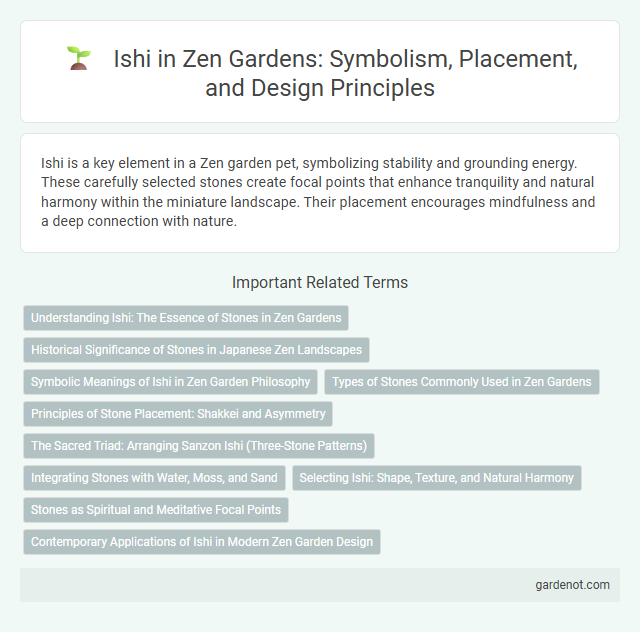Ishi is a key element in a Zen garden pet, symbolizing stability and grounding energy. These carefully selected stones create focal points that enhance tranquility and natural harmony within the miniature landscape. Their placement encourages mindfulness and a deep connection with nature.
Understanding Ishi: The Essence of Stones in Zen Gardens
Ishi, meaning stones in Japanese, serve as the foundational elements in Zen gardens, symbolizing islands, mountains, or animals that embody natural harmony. Each ishi's size, shape, and placement are meticulously chosen to evoke tranquility, balance, and meditation, reflecting Zen principles. Their arrangement creates a visual representation of nature's essence, encouraging mindfulness and inner peace.
Historical Significance of Stones in Japanese Zen Landscapes
Ishi, meaning "stone" in Japanese, holds profound historical significance in Zen gardens as symbolic elements embodying natural landscapes and spiritual concepts. These stones are carefully selected and positioned to represent mountains, islands, or animals, creating a meditative environment that fosters mindfulness and contemplation. The tradition of integrating ishi in Zen landscapes dates back to the Muromachi period, reflecting centuries-old philosophies of harmony between nature and human presence.
Symbolic Meanings of Ishi in Zen Garden Philosophy
Ishi, the carefully placed stones in a Zen garden, symbolize the harmony between nature and the human spirit, embodying stability, strength, and endurance. Each stone's shape, size, and arrangement are deliberately chosen to evoke natural landscapes and spiritual concepts, reflecting the Zen principles of simplicity and mindfulness. These stones guide meditation by inspiring contemplation of impermanence and inner tranquility within the minimalist environment of the garden.
Types of Stones Commonly Used in Zen Gardens
Ishi, or stones, are fundamental elements in Zen gardens, symbolizing mountains, islands, or animals depending on their shape and placement. Common types include granite for its durability, basalt for its dark, calming aesthetic, and limestone for softer textures that evoke natural erosion. Each stone type is carefully selected to enhance the garden's harmony and spiritual balance, reflecting traditional Japanese principles.
Principles of Stone Placement: Shakkei and Asymmetry
Shakkei, or "borrowed scenery," integrates surrounding landscapes into the Zen garden's composition, enhancing the perceived depth and harmony of stone placement. Asymmetry in stone arrangement emphasizes natural balance and dynamic tension, avoiding uniformity to evoke the tranquil spontaneity of nature. These principles guide Ishi placement to create contemplative spaces that inspire mindfulness and aesthetic appreciation.
The Sacred Triad: Arranging Sanzon Ishi (Three-Stone Patterns)
Sanzon Ishi, or the Three-Stone Patterns, form the Sacred Triad in Zen garden design, symbolizing the unity of heaven, earth, and humanity. These carefully arranged stones create a serene focal point that embodies balance, harmony, and spiritual connection. The precise placement of the triad reflects Zen principles and enhances the contemplative atmosphere of the garden.
Integrating Stones with Water, Moss, and Sand
Ishi, or stones, form the central elements in a Zen garden, expertly integrated with water, moss, and sand to create harmony and balance. Carefully placed stones mimic natural landscapes, complementing flowing water features and soft moss to evoke tranquility. The textured sand patterns around the ishi enhance visual flow, symbolizing waves or ripples, amplifying contemplative serenity.
Selecting Ishi: Shape, Texture, and Natural Harmony
Selecting ishi for a Zen garden involves careful consideration of shape, texture, and natural harmony to create a tranquil atmosphere. Smooth, rounded stones promote a sense of calm, while rough, angular ishi add dynamic contrast, enhancing visual interest. Choosing stones that complement the garden's natural elements ensures a balanced and harmonious design reflective of Zen principles.
Stones as Spiritual and Meditative Focal Points
Ishi stones in Zen gardens serve as powerful spiritual and meditative focal points, embodying natural simplicity and profound symbolism. These carefully selected and arranged stones create a serene atmosphere that facilitates mindfulness and inner contemplation. Their presence encourages practitioners to connect deeply with nature, fostering tranquility and spiritual awakening.
Contemporary Applications of Ishi in Modern Zen Garden Design
Ishi, or carefully placed stones, serve as focal points in contemporary Zen garden design, symbolizing mountains, islands, and natural elements that promote tranquility and reflection. Modern applications integrate Ishi with minimalist aesthetics, using natural textures and asymmetrical arrangements to enhance mindfulness and spatial harmony. These stones often guide the flow of movement and meditation, bridging traditional Zen principles with innovative landscape architecture.
Ishi Infographic

 gardenot.com
gardenot.com